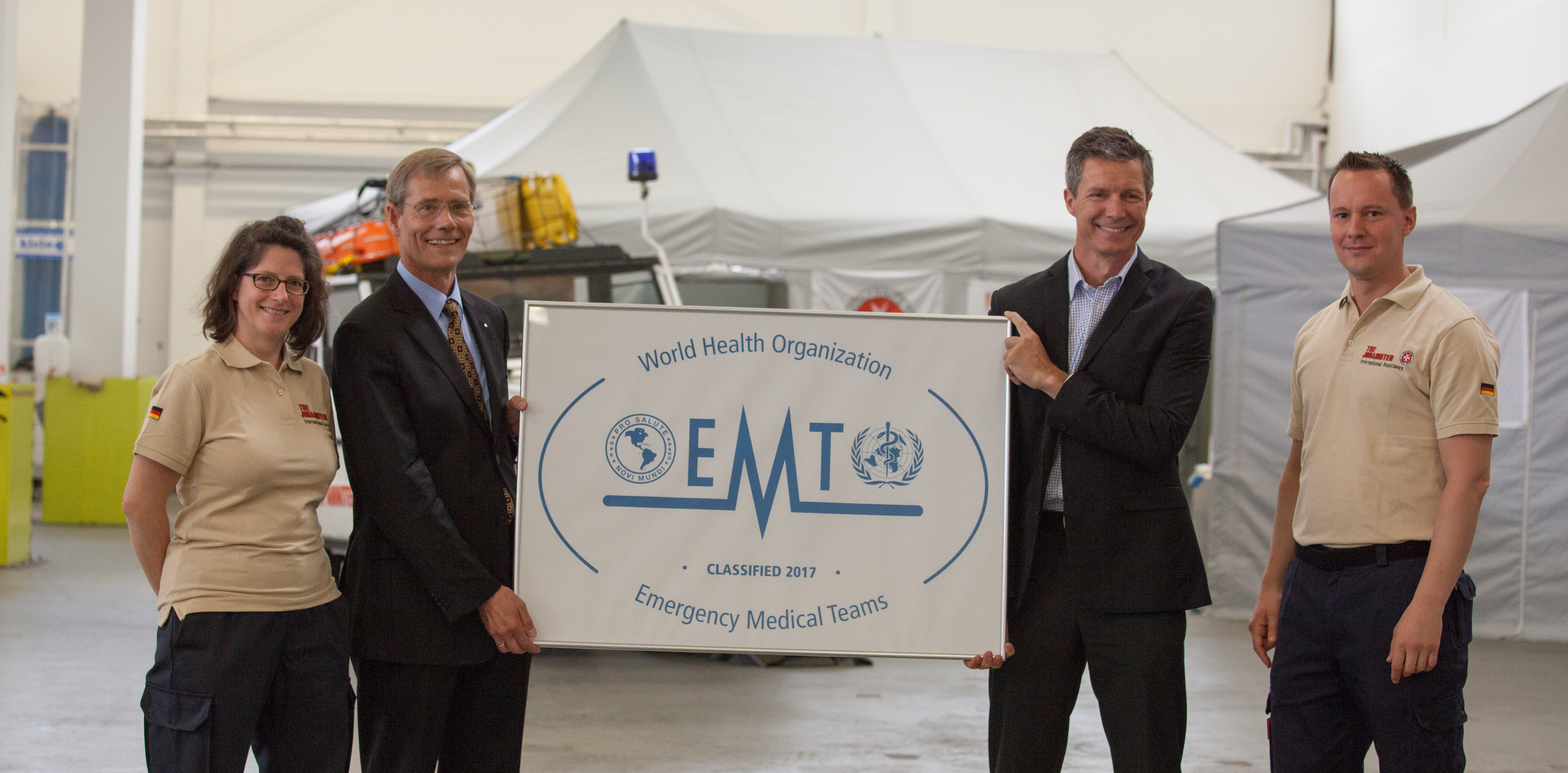News
Region:
EuropeCountry:
GermanyNews Topic:
Mental Health15 June 2017—This week the WHO EMT Secretariat led the classification of two more Emergency Medical Teams (EMT), adding to the global number of self-sufficient teams ready to be deployed to health emergencies should the need arise. The German teams, Johanniter International Assistance and Arbeiter-Samariter-Bund, are the first NGO’s to join the directory of classified teams, with Johanniter International being the first mobile Emergency Medical Team to be classified globally. The EMT directory so far has 11 classified teams and over 70 organizations working towards classification.
Johanniter International Assistance

Johanniter International Assistance is part of Johanniter-Unfall-Hilfe, one of the biggest NGO’s in Europe that has been operating for over 900 years. With its 50,000 employees and volunteers, Johanniter provides social services to hundreds of thousands of people in Germany every year. Johanniter International Assistance is capable of internationally deploying a self-sufficient type 1 mobile EMT, providing basic outpatient emergency care for at least 50 patients a day for two weeks. This mobility is significant as it contributes to increased access to essential emergency health care in remote locations where help is most needed and where time is of the essence. Their teams have previously deployed to several emergencies including the devastating Nepal Earthquake in 2015.
“With its EMT, Johanniter International Assistance is well prepared to respond rapidly and effectively to disasters worldwide“, said Oliver Rodewald, head of international disaster response at Johanniter International Assistance. “We are very proud to be the first mobile team worldwide. Johanniter believes in the importance of having quality standards also in response to disasters.“
Arbeiter-Samariter-Bund (ASB) Deutschland e.V
ASB - which means "Workers' Samaritan Federation" in German - is also no stranger to emergencies having deployed to the Philippines to provide assistance to the victims of typhoon Haiyan in 2013 and also supporting Syrian refugees in an IDP camp in Northern Iraq in 2012. The First Assistance Samaritan Team (FAST) from ASB is a type 1 fixed EMT capable of providing outpatient emergency care for at least 100 patients a day, operating self-sufficiently. The average duration of deployment is six weeks – usually corresponding to the immediate post-disaster emergency period when the need is most demanding.
“We are very honored to be one of the first NGO’s to be classified globally. Our teams have worked tirelessly throughout the years to ensure we are able to provide rapid and direct relief to all those in need of our support. This classification is not only a testament to the work we have done but also great motivation for us to carry on our work helping people in acute distress.”, said Mr Carsten Stork, head of ASB’s foreign aid.
About the WHO EMT Initiative
The WHO EMT initiative helps to improve the timeliness and quality of health services provided by national and international Emergency Medical Teams and enhance the capacity of national health systems in leading the activation and coordination of this response in the immediate aftermath of a sudden-onset emergency or outbreak. EMTs play a critical role in contributing to national, regional and global response capacities. With national health systems increasingly adopting the EMT minimum standards and principles as well as the gradually growing number of internationally classified teams, governments can be assured of a predictable and timely response by self-sufficient teams with well-trained health personnel.
The EMT classification launched in 2016 and managed by the WHO EMT Secretariat is a process whereby Emergency Medical Teams sign up to be mentored and eventually classified as internationally deployable EMT that abide by the international minimum standards and principles for EMTs. The WHO EMT Secretariat manages a global directory of all EMTs that have committed to meet the minimum standards for deployment and provide time-limited surge clinical capacity to the affected populations. It serves as a support mechanism for affected Governments requiring assistance and all partners who aim to provide clinical care in emergencies such as tsunami, earthquake, flood, and more recently, in large outbreaks, such as the West Africa Ebola outbreak. The directory allows a country affected by a disaster or other emergency to call on teams that have been classified and quality assured.

